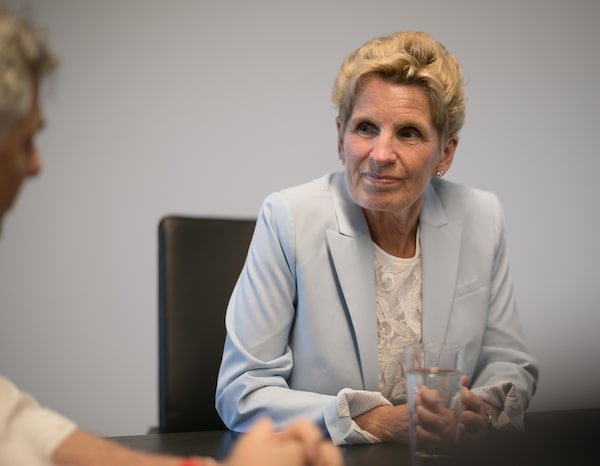Kathleen Wynne was responding to a question about her opponent’s claim that he would revive Ontario’s traditional manufacturing sector, largely through a corporate tax cut, when she invoked “Doug Ford’s notion that somehow he can turn back the clock to 1965.”
It was an unusually apt off-the-cuff assessment of one politician by another, during a Tuesday visit by the Liberal Leader to The Globe and Mail’s editorial board, that could have been applied much more broadly to the nature of Mr. Ford’s pitch to become Ontario’s next premier.
Whereas some leaders promise to usher their countries or provinces or cities into a brave new future, Mr. Ford is a nostalgia candidate. You can see it not just in his economic messaging, but in his vows to roll back both the mathematics and sexual-education curriculums now taught in schools, stop worrying so much about climate change, make “buck a beer” a thing again. And you can hear it, in the tone he uses to make his underlying case for returning to a simpler time, in which people can get ahead just by working hard, so long as government elites get out of their way.
It’s hard to disagree with Ms. Wynne’s description during Tuesday’s meeting of this appeal (the economic part, at least) as “illusory.” There has been so much change across not just Ontario but the Western world since the 20th century – because of technology, globalization, shifting demographics, urbanization, changing social mores and recognition of how unequal life was back in the good old days – that it’s highly improbable any provincial politician is going to turn back the clock.
But it’s also easy to understand why the Progressive Conservative Leader’s back-to-the-future populism resonates with Ontarians who feel left behind by all the change – albeit fewer, based on recent polls, than his campaign team initially anticipated. And likewise to grasp why the Liberals’ attempts to be more forward-looking have proved a hard sell, even among people who know what Mr. Ford is offering is too good to be true.
The left-behind voters are not in short supply. They’re easiest to find in smaller cities, especially in Southwestern Ontario, where big factories no longer provide stable and well-paying jobs, and younger people with opportunities have fled. But they’re in the Greater Toronto Area, too – families grappling with the cost of living rising faster than wages, immigrants unable to advance past low-paying jobs, commuters who feel they’re living in their cars rather than with their families, older generations fearing for younger ones as they themselves struggle to adapt to the digital age.
Few politicians speak as thoughtfully about these challenges, in a setting such as an editorial-board meeting, as Ms. Wynne. She can draw on an ambitious (and expensive) array of policies her government has recently introduced – among them a higher minimum wage, a basic-income pilot, free tuition for students from lower-income families, elimination of preschool fees. And she knows her way around the weeds discussing the evolution of regional development funds or other more granular ways an activist government tries to help with transition.
But the further she is from a downtown Toronto boardroom, the more Ms. Wynne has developed an image as someone who can’t understand what Ontarians are going through, because she’s too busy talking down to them.

Ontario Liberal Leader Kathleen Wynne takes part in an interview at The Globe and Mail offices.Melissa Tait/The Globe and Mail
Some of the dismissal of her as a school marm is sexist, and voters have all sorts of other reasons for irrationally strong negative feelings toward certain politicians.
But by her own admission, Ms. Wynne was too slow to recognize how financially squeezed Ontarians felt by her government’s energy policies, and there has been a righteousness to her defence of some of her biggest policies – cap-and-trade, minimum wage – that can cast people who feel adversely affected by them as troglodytes. However her new “sorry, not sorry” defence of her record is intended, it probably only confirms to many people that she’s smugly out of touch.
Read more: Ontario’s Wynne says she regrets handling of electricity prices
Also: It would be tough for any leader of a party in power nearly 15 years to win voters’ trust to confront struggles that have mounted over that time. People who don’t like the present, and don’t want to go back to the past, are inclined to turn to someone else offering new things.
In this campaign, that seems to be Andrea Horwath. The NDP Leader is not as cerebral as Ms. Wynne about socio-economic modernization, and her party’s more rigid ideology may leave less room to be nimble. But she’s proposing variations of many recent Liberal policies – in some cases, such as pharmacare expansion, more ambitiously – while tapping into the left-behind feelings without having contributed to them.
The New Democrats’ surge in the polls this campaign, while Mr. Ford’s Tories slide, may be cold comfort to Ms. Wynne as her Liberals run third. But if her government becomes history on June 7, she may one day appreciate that Ontarians didn’t just try to go back to what came before it.
Ontario Premier Kathleen Wynne says Ottawa had to find a balance between environmental protections and the economic viability of the country in buying out the Kinder Morgan Trans Mountain project.
 Adam Radwanski
Adam Radwanski